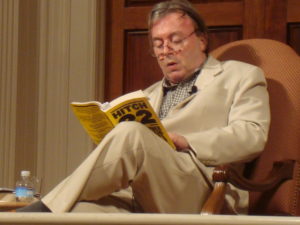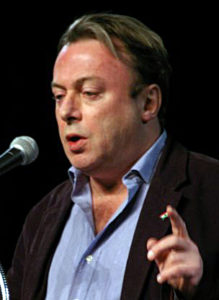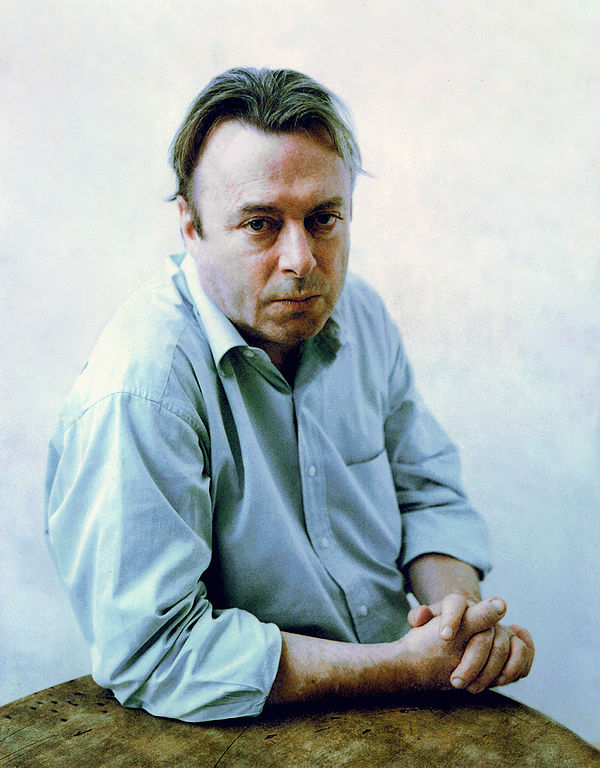It’s been said that there are no atheists in foxholes. One might add death row and chemotherapy wards to this list places where people are eager to find that old-time religion. There’s nothing like the cold, hard specter of death to transform the most intellectually arrogant into a god-fearing believer. Unless, of course, you happen to be Christopher Hitchens.
For more than four decades, the impressive intellect of British-born Christopher Hitchens has been evident in books, essays, magazines and newspaper articles. He has dazzled and infuriated audiences on the lecture circuit and on his frequent television appearances. He hangs out with literati such as Ian McEwan and Martin Amis and chats with TV satirist Jon Stewart. There is very little ambivalence regarding Hitchens – people either love him or hate him.
As a self-described radical, he is known for his admiration for the personages of George Orwell, Thomas Paine and Thomas Jefferson while loathing a wildly diverse group that includes Mother Teresa, Henry Kissinger and Bill and Hillary Clinton. His early career as a liberal journalist was transformed by the attacks of September 11, 2001, when he became more enamored with an interventionist foreign policy that was coupled with his criticism of “fascism with an Islamic face.
Faith: Without a Hitch
Hitchens is perhaps best known for his championing of the new atheism movement. He prefers to describe himself as an “anti-theist” and a believer in the philosophical values of the Enlightenment.
 He would, no doubt, be pleased to know that when the term “the enlightenment” was entered into the Google search engine, 4,430,000 references were immediately found. Several of these sources noted that “The Enlightenment is an era in Western philosophy and intellectual, scientific, and cultural life, centered upon the 18th century, in which reason was advocated as the primary source for legitimacy and authority.” He wrote about his views on the Enlightenment philosophy in his 2007 book “god is Not Great: How Religion Poisons Everything.”
He would, no doubt, be pleased to know that when the term “the enlightenment” was entered into the Google search engine, 4,430,000 references were immediately found. Several of these sources noted that “The Enlightenment is an era in Western philosophy and intellectual, scientific, and cultural life, centered upon the 18th century, in which reason was advocated as the primary source for legitimacy and authority.” He wrote about his views on the Enlightenment philosophy in his 2007 book “god is Not Great: How Religion Poisons Everything.”
With his best-selling books, great box office on the lecture circuit and large groups of adoring fans and vocal enemies (which seem to energize the author), Christopher Hitchens has been a literary whirling dervish. His obvious erudition was again put on display in June 2010 with the release of another book called “Hitch-22: A Memoir.” As he had always done, he hit the road to promote this book and to verbally joust with friends and foes alike.
After only a few weeks of the new book’s promotion, Hitchens encountered his own foxhole. This confident, brilliant force of nature had to cancel the remainder of the tour when he was diagnosed with esophageal cancer.
The Mayo Clinic website notes that esophageal cancer is a malignant tumor of the esophagus, the muscular tube that moves food from the mouth to the stomach. It occurs most often in men over 50 years old and two main types of esophageal cancer exist: squamous cell carcinoma and adenocarcinoma. Squamous cell esophageal cancer is associated with smoking and alcohol consumption and adenocarcinoma is often brought on by gastroesophageal reflux disease. Hitchens’ self-professed overindulgence of smoking and drinking and his diet made him a prime candidate for this deadly disease.
Hitchens as an Anti-theist
There is little doubt that Christopher Hitchens is anything but God-fearing. He has been quoted extensively in dozens of news stories, book reviews, religious websites as saying that “An antitheist, a term I’m trying to get into circulation, is someone who is relieved that there’s no evidence for the existence of God.”
In his book “god is Not Great,” where the “g” was purposefully left in the lower case in a show of disrespect for this deity, he argues that “the concept of God or a supreme being is a totalitarian belief that destroys individual freedom, and that free expression and scientific discovery should replace religion as a means of teaching ethics and defining human civilization.”
In an August 14, 2010 article in the New York Times, Hitchens was asked if he found it insulting for people to pray for him. His response was typically acerbic. He responded: “No, no. I take it kindly, under the assumption that they are praying for my recovery.” The article continued: ”Mr. Hitchens dismissed both the notion that his cancer would lead him to make a tardy profession of faith and the idea that, if it did, such a profession would be valid. ‘The entity making such a remark might be a raving, terrified person whose cancer has spread to the brain,” he said. “I can’t guarantee that such an entity wouldn’t make such a ridiculous remark, but no one recognizable as myself would ever make such a remark.” He concluded, ‘Literature, not scripture, sustains the mind and — since there is no other metaphor — also the soul.’”
The Topic of Cancer
As one would expect from this celebrated wordsmith, Hitchens announced his illness in a witty but somewhat sad essay, entitled “Topic of Cancer,” in the September 2010 edition of “Vanity Fair” magazine. With little or no angst and more humor than horror, he described the morning when he found that he had cancer: “I have more than once in my lifetime woken up feeling like death. But nothing prepared me for the early morning last June when I came to consciousness feeling as if I were actually shackled to my own corpse. The whole cave of my chest and thorax seemed to have been hollowed out and then refilled with slow-drying cement.”
 In the article Hitchens wrote about the stages of grief. His own words reveal a bemused observer. “The notorious stage theory of Elisabeth Kübler-Ross, whereby one progresses from denial to rage through bargaining to depression and the eventual bliss of “acceptance,” hasn’t so far had much application in my case. In one way, I suppose, I have been “in denial” for some time, knowingly burning the candle at both ends and finding that it often gives a lovely light. But for precisely that reason, I can’t see myself smiting my brow with shock or hear myself whining about how it’s all so unfair: I have been taunting the Reaper into taking a free scythe in my direction and have now succumbed to something so predictable and banal that it bores even me. Rage would be beside the point for the same reason. Instead, I am badly oppressed by a gnawing sense of waste.”
In the article Hitchens wrote about the stages of grief. His own words reveal a bemused observer. “The notorious stage theory of Elisabeth Kübler-Ross, whereby one progresses from denial to rage through bargaining to depression and the eventual bliss of “acceptance,” hasn’t so far had much application in my case. In one way, I suppose, I have been “in denial” for some time, knowingly burning the candle at both ends and finding that it often gives a lovely light. But for precisely that reason, I can’t see myself smiting my brow with shock or hear myself whining about how it’s all so unfair: I have been taunting the Reaper into taking a free scythe in my direction and have now succumbed to something so predictable and banal that it bores even me. Rage would be beside the point for the same reason. Instead, I am badly oppressed by a gnawing sense of waste.”
He was defiant even in the language used to describe the ordeal. “The bargaining stage, though. Maybe there’s a loophole here. The oncology bargain is that, in return for at least the chance of a few more useful years, you agree to submit to chemotherapy and then, if you are lucky with that, to radiation or even surgery. Unfortunately, it also involves confronting one of the most appealing clichés in our language. You’ve heard it all right. People don’t have cancer: they are reported to be battling cancer. No well-wisher omits the combative image: You can beat this.”
He continued, “Myself, I love the imagery of struggle. I sometimes wish I were suffering in a good cause, or risking my life for the good of others, instead of just being a gravely endangered patient. Allow me to inform you, though, that when you sit in a room with a set of other finalists, and kindly people bring a huge transparent bag of poison and plug it into your arm, and you either read or don’t read a book while the venom sack gradually empties itself into your system, the image of the ardent soldier or revolutionary is the very last one that will occur to you. You feel swamped with passivity and impotence: dissolving in powerlessness like a sugar lump in water.”
Who Will Pray for Christopher Hitchens?
The fate of the soul of Christopher Hitchens presents a serious conundrum for those who profess a faith in a higher being. The Christians, Muslims and Jews who know anything about him probably feel one of two ways – they either detest or pity him. However, who will pray for him? This begs the question: Why would any God care about someone who has worked so diligently to disprove His existence?
In the case of Christians, there is a large group of believers who tend to view their deity as demanding and even vengeful. The ardent believers of these Old Testament admonitions would likely feel little remorse for the soul of Hitchens. Their response to him might be “OK, smart guy, you’ve trash-talked God one time too many and now you’re doomed to eternal damnation. How’s that Enlightenment looking to you now?”
On the other side of this theological divide are the people of faith who believe that the soul of Christopher Hitchens is just as important and redeemable as the most pious among us. These people would argue that, for all his irreverence and blasphemy, Hitchens is already forgiven. These believers feel that the only necessary step is for him to profess his belief in God – upper case, not lower.
As for how Hitchens plans to spend his final days on earth while battling cancer that will eventually take his life, the avowed atheist says he will not “make a deal” with a higher power. While one should never underestimate the powers of conversion found on a death bed, it appears that he will follow the advice of Dylan Thomas and refuse to “go gentle into that good night.” He will likely continue to “rage, rage against the dying of the light.”






